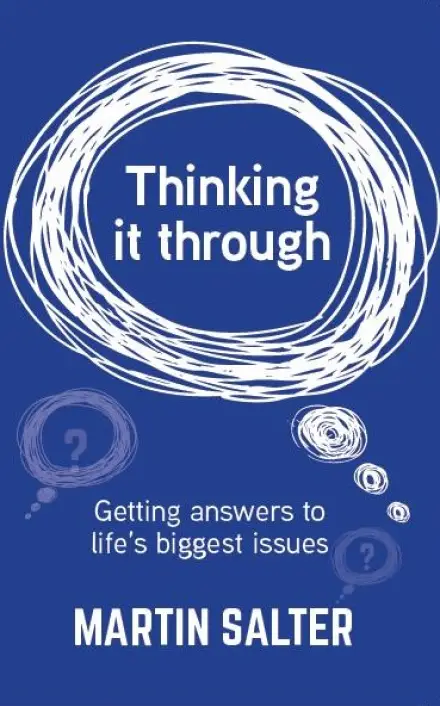What's it All About
This is an excellent primer in the field of apologetics, to challenge the functionally atheistic worldview of a disinterested friend. It doesn’t mean much if we start to tell someone that God is angry with our sin, unless they first believe God exists and that there is such a thing as sin. It’s a very brief read and easy enough for an ordinary reader to follow – no need for A–level philosophy. It’s helpful to give in in combination with Uncover – John’s Gospel – which is a really useful edition of John’s Gospel with online support designed to explain and explore the gospel.
Ralph Manning
What's it All About
I bought two of these: one for myself and one for my next-door neighbours. It is quick to read, unintimidating, readily accessible and thus ideally suited for giving to non-Christians or those who may not consider themselves to be 'readers'. Pages 5-42 outline the importance of the six key questions and engage the reader. Pages 43-47 (yes - five (very short) pages) present concise and scriptural answers to the questions. Not preachy but true and succinct. Would suit teenagers and adults alike.
Esther
Accurate and Concise
I bought two of these: one for myself and one for my next-door neighbours. It is quick to read, unintimidating, readily accessible and thus ideally suited for giving to non-Christians or those who may not consider themselves to be 'readers'. Pages 5-42 outline the importance of the six key questions and engage the reader. Pages 43-47 (yes - five (very short) pages) present concise and scriptural answers to the questions. Not preachy but true and succinct. Would suit teenagers and adults alike.
Esther
What's it All About
Martin Salter, who is part of the leadership at Grace Community Church Bedford, tackles six fundamental questions about life which everyone asks at some stage: Where have we come from?; Where are we going?; What are we here for?; What’s wrong?; What’s the solution? and How do we know? These are well chosen. It is contemporary in style with a good selection of pertinent quotations from Leo Tolstoy to Siri on your iPhone! The chapters quietly nudge readers in a Christian direction. It’s a great booklet to give away.
In the last chapter Martin comes clean about his own position and explains the gospel by moving deftly through all the questions again with the Bible’s answer for each. This is fairly low key. But on the other hand quite a few enquirers we meet are intrigued about Christian faith but are not ready to be blasted by a full–blooded, no holds barred, gospel presentation. The low–key approach could be just right for them.
John Benton – Evangelicals Now
Just right!
Martin Salter, who is part of the leadership at Grace Community Church Bedford, tackles six fundamental questions about life which everyone asks at some stage: Where have we come from?; Where are we going?; What are we here for?; What’s wrong?; What’s the solution? and How do we know? These are well chosen. It is contemporary in style with a good selection of pertinent quotations from Leo Tolstoy to Siri on your iPhone! The chapters quietly nudge readers in a Christian direction. It’s a great booklet to give away.
In the last chapter Martin comes clean about his own position and explains the gospel by moving deftly through all the questions again with the Bible’s answer for each. This is fairly low key. But on the other hand quite a few enquirers we meet are intrigued about Christian faith but are not ready to be blasted by a full–blooded, no holds barred, gospel presentation. The low–key approach could be just right for them.
John Benton – Evangelicals Now
What's it All About
This book is highly unusual in two respects: its subject matter and its length. Both make it an incredibly useful resource. It is an evangelistic book that doesn’t immediately scream ‘Christian’. Setting out six philosophical questions that everyone has an answer to – however incoherent – Salter proceeds to sketch out the main issues associated with each. He does this without ‘pushing’ God, or Jesus, until the very end, where, after having cleared away a lot of epistemological baggage, he humbly but clearly sets out the Gospel in a short section entitled ‘For What It’s Worth’.
I felt this format was extremely effective. The reader can take the preceding pages as perceptive reflections on such topics as origins and purpose, and it does not feel like it is in any way seeking to deceive the reader by claiming to be philosophical and yet harping on about ‘religion’ on every page.
The second unique selling point about this book is its length. It feels and looks like a book, with a cover, a spine etc, and yet because of its judicious use of spacing and large type for the six questions, doesn’t actually contain many words (total: 47 pages). Therefore, a casual reader has both a decent chance of finishing it, and also of being left with a smug feeling that he just read a whole book. This book would work extremely well (for this last point, if nothing else) for teenagers/ students.
However, Salter deserves serious commendation, for despite the constrictions of length, he has succeeded in producing something which does not feel patronising or superficial. The book engages with some of the ideas currently taught on A Level Philosophy and Ethics specifications (e.g. AJ Ayer’s Verification Principle and Plato’s analogy of the Cave both get more than a mention)and illustrations, personal or otherwise, advance the argument of each section, rather than functioning as padding. The reader is left with the feeling that the author has genuinely engaged with the best of the opposition, and taken them seriously.
I have never seen a book like this. May the Lord use it to ‘demolish arguments’ and to equip believers to respectfully and confidently engage with a sceptical world.
Sharon Crisp
Unique resource
This book is highly unusual in two respects: its subject matter and its length. Both make it an incredibly useful resource. It is an evangelistic book that doesn’t immediately scream ‘Christian’. Setting out six philosophical questions that everyone has an answer to – however incoherent – Salter proceeds to sketch out the main issues associated with each. He does this without ‘pushing’ God, or Jesus, until the very end, where, after having cleared away a lot of epistemological baggage, he humbly but clearly sets out the Gospel in a short section entitled ‘For What It’s Worth’.
I felt this format was extremely effective. The reader can take the preceding pages as perceptive reflections on such topics as origins and purpose, and it does not feel like it is in any way seeking to deceive the reader by claiming to be philosophical and yet harping on about ‘religion’ on every page.
The second unique selling point about this book is its length. It feels and looks like a book, with a cover, a spine etc, and yet because of its judicious use of spacing and large type for the six questions, doesn’t actually contain many words (total: 47 pages). Therefore, a casual reader has both a decent chance of finishing it, and also of being left with a smug feeling that he just read a whole book. This book would work extremely well (for this last point, if nothing else) for teenagers/ students.
However, Salter deserves serious commendation, for despite the constrictions of length, he has succeeded in producing something which does not feel patronising or superficial. The book engages with some of the ideas currently taught on A Level Philosophy and Ethics specifications (e.g. AJ Ayer’s Verification Principle and Plato’s analogy of the Cave both get more than a mention)and illustrations, personal or otherwise, advance the argument of each section, rather than functioning as padding. The reader is left with the feeling that the author has genuinely engaged with the best of the opposition, and taken them seriously.
I have never seen a book like this. May the Lord use it to ‘demolish arguments’ and to equip believers to respectfully and confidently engage with a sceptical world.
Sharon Crisp
What's it All About
One of the biggest struggles today in the West is battling against spiritual disinterest. True: there has been a rise in some “spiritual” ideas, literature, and practice. But by and large, our generation in Western Europe – and, increasingly, in North America – is dominated by a lack of concern or interest in spiritual matters.
That presents a significant challenge for how we, as Christians, share the good news of Jesus’ life, death, resurrection, and ascension with our friends. If you combine the ruling, societal paradigm of relativistic individualism with spiritual disinterest, the biggest battle in evangelising unbelievers is how we can overcome the default, “So what?/I don’t care” position.
Martin Salter‘s new book, 'What’s it all about?,' aims to help us break out of this conundrum by posing simple but provocative questions in an engaging manner that make people think. This short book is a quick read (it’s only 47 pages long), but it asks probing questions that should encourage people to think seriously about what they functionally base their life upon – even if they may not think they “believe” in anything. As Salter rightly observes, “All human beings have ways of answering the biggest questions of life; ways of making sense of the world; ways of ordering their lives according to a set of principles and values.”
This book is a helpful way of prompting readers to think about how they answer the biggest questions of life. It’s structured around six thought-provoking questions:
1. Where have we come from?
2. Where are we going?
3. What are we here for?
4. What’s wrong?
5. What’s the solution?
6. How do we know?
But don’t be daunted by the breadth of the questions! Salter doesn’t delve into dizzying detail with any of them. Rather, his approach is to discuss each briefly with a view to demonstrating that whatever we may say we believe or don’t believe, we all answer these questions one way or another.
Though short in length, 'What’s it all about?' isn’t simplistic or superficial in content. The book picks up on the precision of the earth’s creation and location in the universe; the painful reality of sorrow in the face of death; the unavoidable and depressing conclusion of a materialistic worldview taken its logical end; and the challenging issue of where evil comes from. (Salter’s conclusion is spot on: “When asking what’s wrong with our world we have three options – nothing, them, or me. The first seems unimaginable, the second slippery and the third uncomfortable. So which is it?”)
And having raised such important questions, Salter rightly concludes with the most important question of all: “How do we know?” Referencing Plato’s famous cave allegory, he pushes the reader further to really wrestle with how we can be sure about anything that we claim to know.
Then comes the good news! In the final chapter, entitled ‘For what it’s worth’ Salter runs through each of the six questions from his position as a Bible-believing Christian. As with the rest of the book, the answers aren’t lengthy; they’re not littered with Bible verses and proofs for every statement. But in six pages, Salter simply and winsomely presents the Bible’s answer to each of these fundamental questions. His answers summarise the Bible’s meta-narrative, charting God’s perfect creation, the fall of humankind, and the future judgement and new creation. And then comes the proof, the ultimate answer to the “How do we know?” question: namely, the life-altering, worldview-changing, paradigm-shifting person of Jesus Christ.
This book will be an excellent resource for Christians looking to help their non-believing friends think critically about issues of critical importance. It will help reveal the hidden assumptions and “beliefs” we all live by. And, God-willing, it will prompt a whole host of follow-up questions.
My advice? Buy it. Give it away – particularly (though not exclusively) to friends at secondary school and university. And then be ready to respond to your friends after they’ve read it!
James Midwinter
A great resource for challenging people to think!
One of the biggest struggles today in the West is battling against spiritual disinterest. True: there has been a rise in some “spiritual” ideas, literature, and practice. But by and large, our generation in Western Europe – and, increasingly, in North America – is dominated by a lack of concern or interest in spiritual matters.
That presents a significant challenge for how we, as Christians, share the good news of Jesus’ life, death, resurrection, and ascension with our friends. If you combine the ruling, societal paradigm of relativistic individualism with spiritual disinterest, the biggest battle in evangelising unbelievers is how we can overcome the default, “So what?/I don’t care” position.
Martin Salter‘s new book, 'What’s it all about?,' aims to help us break out of this conundrum by posing simple but provocative questions in an engaging manner that make people think. This short book is a quick read (it’s only 47 pages long), but it asks probing questions that should encourage people to think seriously about what they functionally base their life upon – even if they may not think they “believe” in anything. As Salter rightly observes, “All human beings have ways of answering the biggest questions of life; ways of making sense of the world; ways of ordering their lives according to a set of principles and values.”
This book is a helpful way of prompting readers to think about how they answer the biggest questions of life. It’s structured around six thought-provoking questions:
1. Where have we come from?
2. Where are we going?
3. What are we here for?
4. What’s wrong?
5. What’s the solution?
6. How do we know?
But don’t be daunted by the breadth of the questions! Salter doesn’t delve into dizzying detail with any of them. Rather, his approach is to discuss each briefly with a view to demonstrating that whatever we may say we believe or don’t believe, we all answer these questions one way or another.
Though short in length, 'What’s it all about?' isn’t simplistic or superficial in content. The book picks up on the precision of the earth’s creation and location in the universe; the painful reality of sorrow in the face of death; the unavoidable and depressing conclusion of a materialistic worldview taken its logical end; and the challenging issue of where evil comes from. (Salter’s conclusion is spot on: “When asking what’s wrong with our world we have three options – nothing, them, or me. The first seems unimaginable, the second slippery and the third uncomfortable. So which is it?”)
And having raised such important questions, Salter rightly concludes with the most important question of all: “How do we know?” Referencing Plato’s famous cave allegory, he pushes the reader further to really wrestle with how we can be sure about anything that we claim to know.
Then comes the good news! In the final chapter, entitled ‘For what it’s worth’ Salter runs through each of the six questions from his position as a Bible-believing Christian. As with the rest of the book, the answers aren’t lengthy; they’re not littered with Bible verses and proofs for every statement. But in six pages, Salter simply and winsomely presents the Bible’s answer to each of these fundamental questions. His answers summarise the Bible’s meta-narrative, charting God’s perfect creation, the fall of humankind, and the future judgement and new creation. And then comes the proof, the ultimate answer to the “How do we know?” question: namely, the life-altering, worldview-changing, paradigm-shifting person of Jesus Christ.
This book will be an excellent resource for Christians looking to help their non-believing friends think critically about issues of critical importance. It will help reveal the hidden assumptions and “beliefs” we all live by. And, God-willing, it will prompt a whole host of follow-up questions.
My advice? Buy it. Give it away – particularly (though not exclusively) to friends at secondary school and university. And then be ready to respond to your friends after they’ve read it!
James Midwinter






